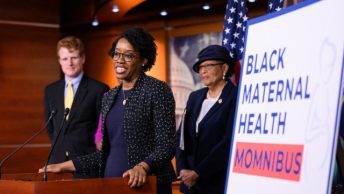The first hospital assignment I received in medical school was to help staff one of the busiest labor and delivery units in America. I started on the night shift, learning to ignore my circadian rhythm, trying to make sense of how giving birth/being born really works. That week was the first time a mother delivered her baby into my (nervous) hands. It was also the first time I had an opportunity to understand reproduction through the lens of social justice, as an act embedded in a set of rights that some people are able to exercise more easily than others.
The labor floor at Women and Infants Hospital in Providence, Rhode Island, has a long set of corridors that can turn from quiet to frenzied in an instant. Dozens of new babies might enter the world in the course of a single night, and in those moments, nearly every labor room fills with the joy most parents experience as they cradle their babies for the first time. But often, the elation quickly gives way to the complex realities of modern parenthood. Providence is not a wealthy city and many of the patients at Women and Infants lack a safety net. I watched us discharge dozens of exhausted new parents with their crying infants and unaffordable medications to months of sleepless nights and hourly wage days.
The hardships parents endure while trying to start or grow their family can be easy to normalize. Most of us do it and somehow we get by, right? And yet, statistically, the American approach to childbirth is cruel. Today, our fellow Americans are 50% more likely to die in childbirth than their own mothers were, and three to four times more likely to die if they are black than if they are white. This is a consequence of racism and misogyny that manifests each day in our country as unreliable medical care, inadequate social support, and economic disempowerment. Expecting More is motivated by a realization that childbirth in America is becoming increasingly dangerous, costly, and socially isolating over time – and that, collectively, we all deserve better.
We have reason to hope for better as well. Last year, the Federal government passed legislation to begin addressing the rising rates of maternal mortality. Currently, multiple presidential candidates are campaigning on their plans to improve the wellbeing of mothers and young families. And in a sign of growing momentum, organizations that work on behalf of mothers and their families are forming unified coalitions to ensure our voices are heard. The question is, what do we want to say?
For decades experts have focused narrowly on the challenge of making sure childbirth is safe. Yet we know that most pregnant people and their families have goals other than emerging from the process unscathed. Survival is the floor of what we deserve. If we’re working towards a better system we should be aiming for the ceiling: care that is not only safe, but also supportive and empowering.
This campaign begins with a recognition that the lived experience of growing families is a crucial form of expertise, one that has been largely absent from the efforts to forge a better system. We created Expecting More to explore what this better system could look like by putting the voices of families alongside professional experts in a common space. We hope to use our collective voices to make clear that the wellbeing of growing families ought to be a bellwether for the wellbeing of our society as a whole. And in the months ahead we hope to reorient the public conversation towards a world in which every person can choose to grow their family with dignity, and a world in which each of us has a clear role to play in supporting them.




